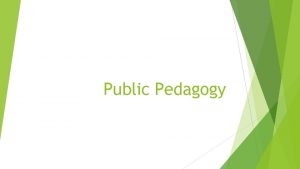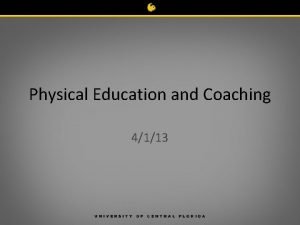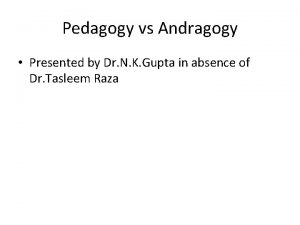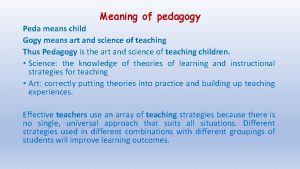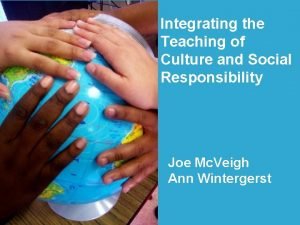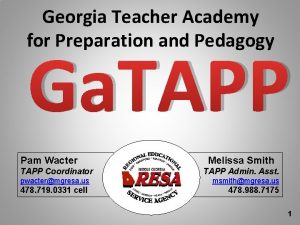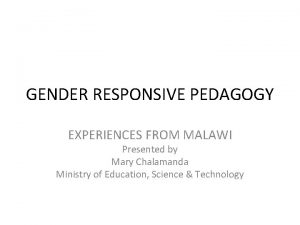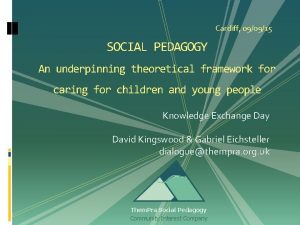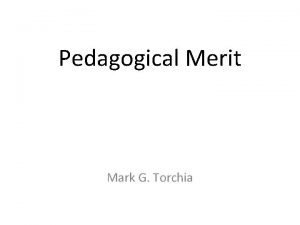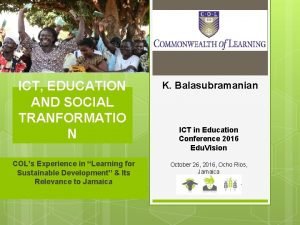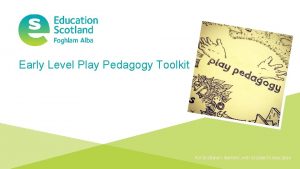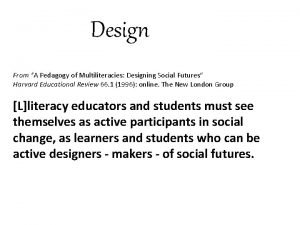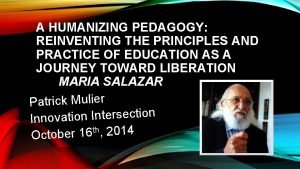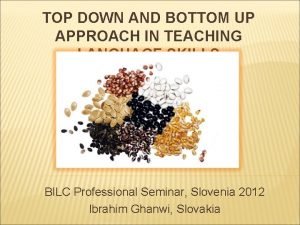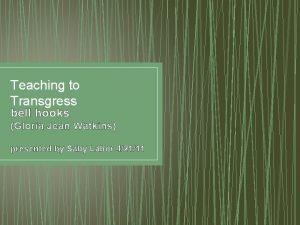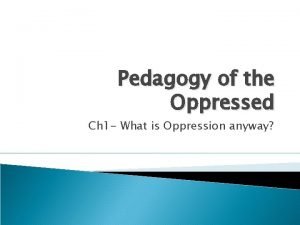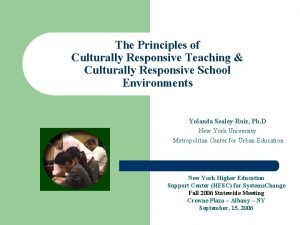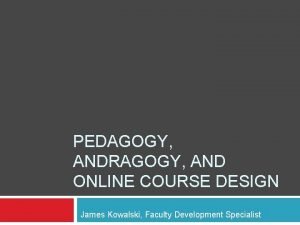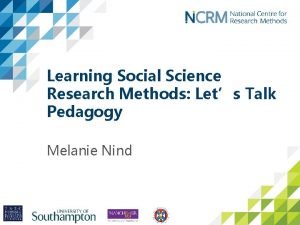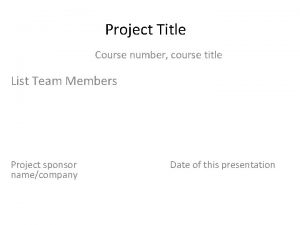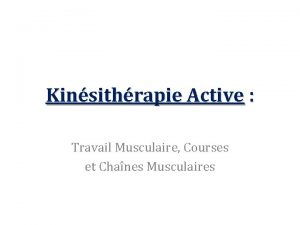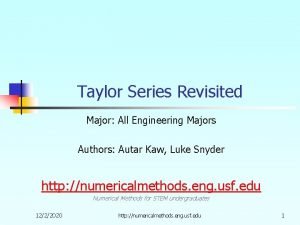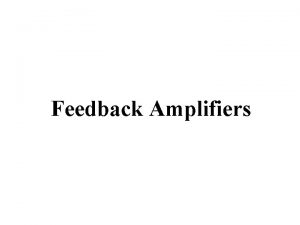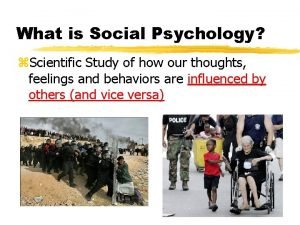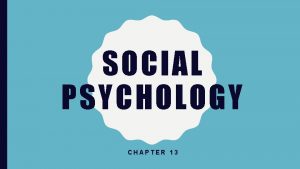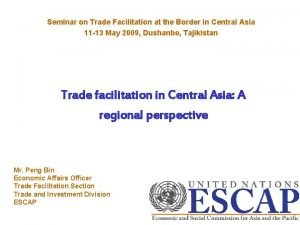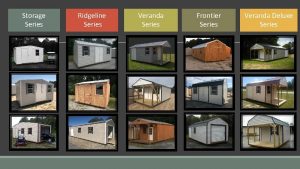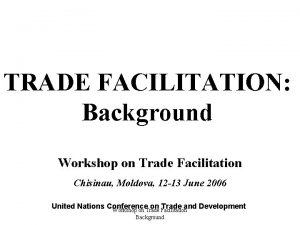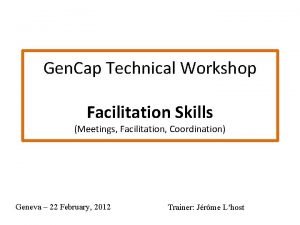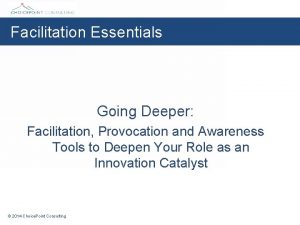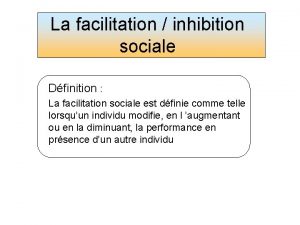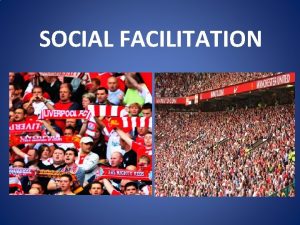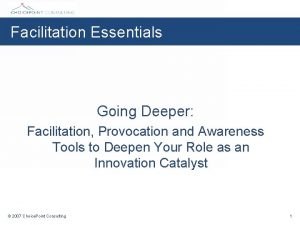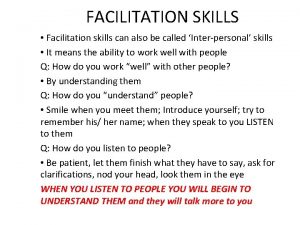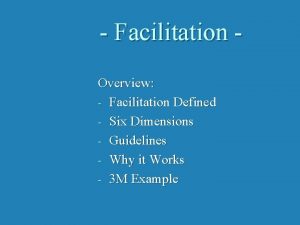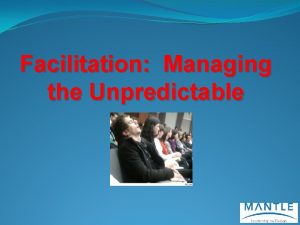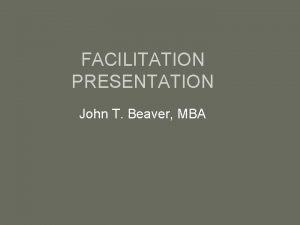AntiRacist Pedagogy Series AntiRacist Course Facilitation Faculty Center






































![STATUS QUO STORIES [DECENTERING THE NARRATIVE OF GLOBAL HISTORY] Global history – shift students’ STATUS QUO STORIES [DECENTERING THE NARRATIVE OF GLOBAL HISTORY] Global history – shift students’](https://slidetodoc.com/presentation_image_h2/926b9580473d0076d43fd2392b3e632e/image-39.jpg)
![STATUS QUO STORIES [DECENTERING THE HISTORY OF FEMINIST THOUGHT] Invert the order in which STATUS QUO STORIES [DECENTERING THE HISTORY OF FEMINIST THOUGHT] Invert the order in which](https://slidetodoc.com/presentation_image_h2/926b9580473d0076d43fd2392b3e632e/image-40.jpg)






- Slides: 46

Anti-Racist Pedagogy Series: Anti-Racist Course Facilitation Faculty Center for Ignatian Pedagogy

Acknowledgements The Loyola community occupies the traditional homelands of the people of the Council of Three Fires, the Ojibwe, Potawatomi, and Odawa as well as the Menominee, Miami and Ho-Chunk nations. This was also a site of trade, travel, gathering and healing for more than a dozen other Native tribes and is still home to over 100, 000 tribal members in the state of Illinois. Thank you to our faculty contributors: • Sasha Adkins • Susan Haarman • Betsy Jones Hemenway • Kristin Krueger • Thea Strand • Aana Vigen

Session Agenda • Laying the groundwork for our discussion • Discussing how to infuse anti-racist pedagogy into these relationships • Student-faculty • Student-student • Student-content • Using the chat feature to engage in dialog • The session is being recorded and all of the materials will be shared on FCIP's website

Invitation for Reflection Beginning from a place of Ignatian Indifference. . . • Regarding things only insofar as they bring you closer to God or the Common Good. • In other words, it’s the capacity to move away from what does not help me to work for justice or love others or connect to God—while staying engaged with what does. • What about my discipline, my research, my pedagogy, or my typical reactions might be something I should "regard with indifference" as I think about Anti-Racist course design?

"Racist" or "Anti-Racist" is what we do, not who we are. (a paraphrase of Ibram X. Kendi)

Intersectionality Kimberlé Crenshaw

power over power within with Which do we model in our classrooms?

This process itself becomes a detour when we focus more on saying the right words than on addressing the root causes of injustice.

Today's Topic: Class Facilitation • Focus on establishing and sustaining relationships in the classroom and beyond • Sites for relationship work 1. Student-faculty 2. Student-student 3. Student-content

Student-Faculty Relationships & Interactions Thea Strand, Ph. D, Anthropology Susan Haarman, MDiv, Center for Experiential Learning Kristin Krueger, Ph. D, Anthropology Aana Vigen, Ph. D, Theology

Day 1: Meeting & Addressing Students • First meeting • Calling roll • Self-introduction • Power and identity in personal address and reference • Names • Pronouns

Names as Proxy for Race & Ethnicity • White, Anglo privilege in "easy, " "normal, " "American" names • Experiences of disempowerment, frustration, and shame for those with minoritized names

Showing Respect & Taking Responsibility 1. 2. 3. 4. 5. Don't call attention to "unusual" (to you!) names or spellings. Review the roster before class, practice out loud. Ask people how they prefer to be called (name, pronouns). Never impose an "easier" (to you!) name. Make a sincere effort in pronunciation, ask for help if needed.

How You Communicate With Your Students. . . And Vice Versa Do you share your expectations in a clear way? • Do students know the best channels / times to get a hold of you? • Is there any flexibility around this? • What are your expectations for how they address you? • Be clear about the tone and purpose of office hours • Especially if teaching first year students, this concept may be new • Huge variance in what office hours are used for

Relationship Building Some ideas to help foster an open, honest, & anti-racist relationships with your students KRISTIN L. KRUEGER, PHD (ANTHROPOLOGY) AANA MARIE VIGEN, PHD (THEOLOGY)

Invite your students in with your syllabus design. (CANVA) Add in a "syllabus treasure“

FULL NAME: PREFERRED NAME: PRONOUNS: YEAR IN SCHOOL (e. g. junior, senior, etc. ): MAJOR/S &/or MINOR/S: CAREER GOALS: GETTING TO KNOW YOU HOBBIES: WHAT ARE YOU HOPING TO LEARN IN THIS COURSE? I WISH MY PROFESSOR KNEW….

DAY ONE sets the tone for the course. Be upfront about your goals, intentions, etc. Be honest about your own whiteness, privilege, social location, etc. "I AM YOUR COACH, NOT YOUR ADVERSARY. "

Talk with your students 1: 1 before class, if possible!

When students talk, really listen.

Bring Your Whole Self intellect/knowledge questions empathy authenticity humor humility & quiet confidence (it won't undermine your authority!)

How? Be Transparent -- share the rationale, decision-making process Attend to power dynamics Listen to Understand (rather than win an argument; professors can bully) Take a Breath (or press pause & come back to it next class; meet individually) It's Ok to say "I don't know. I'll get back to you" (& then do!) Ask Permission - to share information/stories, to make changes to the syllabus, etc. Solicit Input -anony. midterm check ins; let students pick some topics Take Responsibility; Admit Mistakes ( & learn from them)

NO REALLY, HOW? !? ! Human beings are situated in myriad social relationships & identities. These combinations affect our varied/distinct experiences, attitudes, assumptions, & beliefs (worldviews). Individuals are often part of both dominant & subjugated SOCIAL LOCATION RECAP (& I SHARE SOME OF MINE WITH STUDENTS!) identities/groups. Some identifications can be changed (widened, chosen); others are closer to an intrinsic part of who we are (e. g. genetics, family lottery, where you were born, innate attributes, etc. ) Social location matters regardless of our personal beliefs. Not everyone who is white "believes X", yet systems/structures matter—how white people benefit from them. Beliefs alone have little to do with a person’s access to privilege, power, & to affect the decisions/policies of institutions.

SOCIAL LOCATION EXERCISE IN 4 PARTS Anonymous Survey +Social, Historical Analysis ( Parts 1&2) wealth, poverty, health, ed. , crime, policing, incarceration, housing, stereotyping/profiling, decision-maker demographics, discriminatory laws, historical context of monuments & architecture, business practices, climate change environmental racism, etc. What are the deomgraphics in your field? ? Who are the "Experts"? Use Stories & Statistics!

ANONYMOUS SURVEY QUESTION EXAMPLES THEO 185 - VIGEN AGREE WITH THE STATEMENT = Y; DISAGREE WITH IT = N I GREW UP IN A SAFE NEIGHBORHOOD WITH GOOD SCHOOLS. IT WAS ASSUMED FROM A YOUNG AGE THAT I WOULD GO TO COLLEGE. SCHOOLS I HAVE ATTENDED TEACH ABOUT MY RACE & HERITAGE & PRESENT IT IN POSITIVE WAYS. I CAN LOOK IN MAINSTREAM MEDIA & SEE WIDE, FAIR REPRESENTATION OF PEOPLE WHO LOOK LIKE ME. I GREW UP IN A HOUSE OWNED BY MY PARENTS. GROWING UP, I WENT ON REGULAR FAMILY VACATIONS I HAVE NEVER BEEN HOMELESS. I DON'T HAVE TO WORRY ABOUT HELPING MY PARENTS FINANCIALLY WHEN THEY RETIRE. I GENERALLY DON’T WORRY IF THERE WILL BE ENOUGH MONEY TO COVER BASIC EXPENSES NO ONE IN MY IMMEDIATE FAMILY HAS EVER BEEN ADDICTED TO DRUGS OR ALCOHOL. I DON’T HAVE TO COPE WITH FREQUENT CATCALLS BECAUSE OF MY GENDER AND/OR SEXUAL IDENTITY MY PARENTS DO NOT HAVE A NOTED ACCENT. I HAVE FRIENDS OF A RACE(S) DIFFERENT THAN MINE & HAVE BEEN TO THEIR HOME SEVERAL TIMES, HAD SLEEPOVERS AS KIDS, ETC. NEARLY ALL OF MY GOOD/CLOSE FRIENDS & I SHARE THE SAME RACIAL-ETHNIC IDENTITY I SPEND MOST OF MY FREE TIME WITH PEOPLE FROM A SIMILAR RACIAL-ETHNIC & SOCIO-ECONOMIC BACKGROUND AS MINE I CAN BE PRETTY SURE THAT IF I GO INTO A BUSINESS & ASK TO SPEAK TO THE "PERSON IN CHARGE" THAT I WILL BE FACING A PERSON OF MY RACE I NEVER THINK TWICE ABOUT CALLING THE POLICE WHEN TROUBLE OCCURS. I HAVE NEVER FELT STEREOTYPED BY A PERSON IN RELATIVE AUTHORITY OVER ME

Part 3 Social Location In-Class Discussion Exercise: In Small & Then Large Group, Map: (credit to Dr. Jennifer Harvey, Drake University author, Raising White Kids) Institutions Decision-Makers Identifiers

Part 4: CONVERSATIONS ACROSS DIFFERENCE On Healthcare: Interview someone who is different from you in at least 4 different aspects of social location about that person's experience with healthcare. On Social/Political Issues: Have a conversation on a topic you both care about, but have different views & come at it from different social locations. Click here for the Robb Willer TED talk.

What do you to build relationships with your students? What are your biggest struggles? Chat Question

Student-Student Relationships & Interactions Betsy Jones Hemenway, History, Women's Studies & Gender Studies Sasha Adkins, Institute of Environmental Sustainability

Starting points “…our work is not merely to share information but to share in the intellectual and spiritual growth of our students. To teach in a manner that respects and cares for the souls of our students is essential if we are to provide the necessary conditions where learning can most deeply and intimately begin. ” bell hooks, Teaching to Transgress: Education as the Practice of Freedom. Routledge, 1994, 13.

Some possible Day 1 activities: • Students pair up and do 2 -minute interviews of one another with set questions. Then they introduce one another to the rest of the class. How do we create conditions where learning can begin? • In WSGS, I begin with asking about hopes and dreams for our time together. What do students want that experience to be like? Then we collectively come up with specific guidelines (laptop use, raising hands, taking breaks, etc. ). Then I type them up the list and distribute at the next class. We all sign each copy, so each person has the document. • I have a simple "syllabus agreement" where students can confidentially share their preferred name and pronouns, as well as any ongoing issues they might be facing that could affect their work in the class.

After Day 1: How do we create the conditions for learning? • Keep students talking to/with one another • Small group activities in class (summarize a short reading with a Tweet) • Online discussion forums • Student moderators of class discussions • Encourage them to learn one another's names • De-center my own presence by not sitting at the front of the room (at the side of the table in a seminar space, or at the back of the room during student presentations)

Keeping Stack

Come to class prepared to contribute constructively to activities and discussions. Listening well is just as important as speaking well. You will lose points for monopolizing the discussion, for interrupting, for disrespectful body language, or for using jargon or acronyms without explaining them. You will gain points for asking good questions of me and of your peers, for helping to develop or draw out your classmates’ ideas, as well as for your original insights. We’ll be discussing “hot topics. ” A Sufi proverb invites us to consider asking ourselves these questions before speaking: Is it true? Is it kind? Is it necessary? I don’t want anyone to ever feel put on the spot. If I call on you and you have nothing to say, just say “pass” and we’ll move on. You don’t lose points for that. Introverts are welcome to email me their reflections instead of speaking them aloud in class. That earns equivalent class participation points.

small group work: providing tools for success

How do you help build relationships among your students? For folks teaching online, how will you be adapting those practices? Chat question

Student-to. Content Some elements to foster an antiracist classroom Betsy Jones Hemenway, Ph. D Aana Vigen, Ph. D Kristin Krueger, Ph. D

STATUS QUO STORIES “…status-quo stories describe world-views, belief systems, and actions (ontologies, epistemologies, and ethics) that normalize and naturalize the existing social system, values, and standards so entirely that they stunt our imaginations and shape our lives. ” Ana. Louise Keating, Transformation Now! Toward a Post. Oppositional Politics of Change. University of Illinois Press, 2013, 169. How do we re-read or examine these status-quo stories to begin to shift them and our worldviews – and expand our imaginations? What implications might this practice have for course design and facilitation?
![STATUS QUO STORIES DECENTERING THE NARRATIVE OF GLOBAL HISTORY Global history shift students STATUS QUO STORIES [DECENTERING THE NARRATIVE OF GLOBAL HISTORY] Global history – shift students’](https://slidetodoc.com/presentation_image_h2/926b9580473d0076d43fd2392b3e632e/image-39.jpg)
STATUS QUO STORIES [DECENTERING THE NARRATIVE OF GLOBAL HISTORY] Global history – shift students’ expectations of the “standard narrative” by incorporating family history into the curriculum. • Examine casta paintings of colonial Latin America to illustrate multiple dimensions of colonial rule, such as social and political hierarchies, mixed populations, economic consequences, and so on. • Compare early modern marriage practices in Western Europe and China to examine theories about how these are linked to economic development and industrialization.
![STATUS QUO STORIES DECENTERING THE HISTORY OF FEMINIST THOUGHT Invert the order in which STATUS QUO STORIES [DECENTERING THE HISTORY OF FEMINIST THOUGHT] Invert the order in which](https://slidetodoc.com/presentation_image_h2/926b9580473d0076d43fd2392b3e632e/image-40.jpg)
STATUS QUO STORIES [DECENTERING THE HISTORY OF FEMINIST THOUGHT] Invert the order in which material is presented to foreground marginalized voices. • Begin with Indigenous, Black, multicultural, and postcolonial feminisms, rather than the standard 18 th and 19 th century thinkers (who come in later in the semester). • Pairs of students present on each topic and are required to examine the historical roots and specific thinkers in each tradition, so shape the narrative of our learning.

FISHBOWLS Goal: Empathy/Appreciation 4 -5 small groups of students, each represents a different author, experience, story. (Or share their own experiences) In the fishbowl, 2 (or 1) people at a time represent each author/perspective. The others observe. They tap in. All take a turn. Represent the view of the author/view as fairly & as accurately as possible. [Or share their own experience] https: //sites. google. com/site/maryellendakinsclassroom/speaking-and-listening/fishbowl-discussions

TOWN HALLS Discuss the implications of the law, policy, science, history, research, case… Aim: Develop Critical Thinking & Empathy Know Your Students Well Assign Crisp, Credible, Thought. Provoking Articles on a Debatable Topic Assign students to a side different than their own view/experience. (can do more than 2 perspectives). 1 st they role play that view & later may speak as themselves

Center marginalized voices!

Who writes your required texts? Who writes your assigned readings? Who is part of the "canon" in your discipline? What images do you use in your lectures? What videos do you watch? What podcasts do you assign?

This requires extra work & effort, but it's worth it for a more comprehensive experience for your students.

Who is one marginalized scholar/ practitioner you can highlight in your course? Chat question
 Courageous conversations wheel
Courageous conversations wheel Techno pedagogy
Techno pedagogy Public pedagogy definition
Public pedagogy definition What is sport pedagogy
What is sport pedagogy Pedagogical vs andragogical
Pedagogical vs andragogical Pedagogists means
Pedagogists means Example of equity pedagogy
Example of equity pedagogy Ga tapp program
Ga tapp program Gender responsive pedagogy
Gender responsive pedagogy Maria__090915
Maria__090915 Pedagogy pronounce
Pedagogy pronounce Definition of pedagogical analysis
Definition of pedagogical analysis Gradual release of responsibility pedagogy
Gradual release of responsibility pedagogy Paradigm shift from pedagogy to andragogy to heutagogy ppt
Paradigm shift from pedagogy to andragogy to heutagogy ppt Education scotland play pedagogy toolkit
Education scotland play pedagogy toolkit Divine pedagogy
Divine pedagogy A pedagogy of multiliteracies designing social futures
A pedagogy of multiliteracies designing social futures Humanising pedagogy
Humanising pedagogy Bottom up approach teaching
Bottom up approach teaching Bell hooks engaged pedagogy summary
Bell hooks engaged pedagogy summary Pedagogy of the oppressed chapter 1
Pedagogy of the oppressed chapter 1 Contemplative pedagogy definition
Contemplative pedagogy definition Advanced pedagogy and application of ict book pdf
Advanced pedagogy and application of ict book pdf Humanising pedagogy meaning
Humanising pedagogy meaning Epistemology and pedagogy
Epistemology and pedagogy Culturally relevant pedagogy
Culturally relevant pedagogy Andragogy meaning in kannada
Andragogy meaning in kannada Pedagogy definition
Pedagogy definition Multiple intelligences test
Multiple intelligences test Webinar organisational change
Webinar organisational change Half brick wall in stretcher bond
Half brick wall in stretcher bond Course title and course number
Course title and course number Course interne moyenne externe
Course interne moyenne externe Maclaurin series vs taylor series
Maclaurin series vs taylor series Heisenberg 1925 paper
Heisenberg 1925 paper Taylor series of composite functions
Taylor series of composite functions Maclaurin polynomial
Maclaurin polynomial Ibm p series server
Ibm p series server The amplifier
The amplifier Series aiding and series opposing
Series aiding and series opposing Sum of infinite series
Sum of infinite series Self fulfilling prophecy examples
Self fulfilling prophecy examples Business facilitation program visa
Business facilitation program visa Social facilitation definition psychology
Social facilitation definition psychology Social traps ap psychology definition
Social traps ap psychology definition Trade facilitation meaning
Trade facilitation meaning Site:slidetodoc.com
Site:slidetodoc.com


